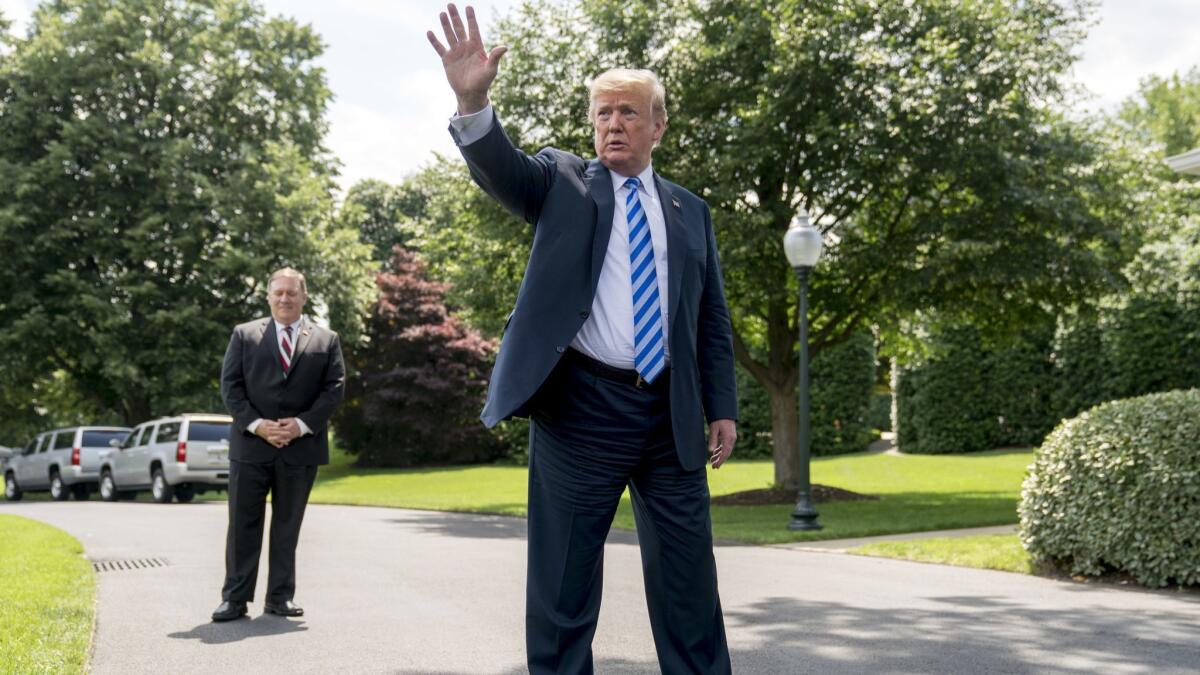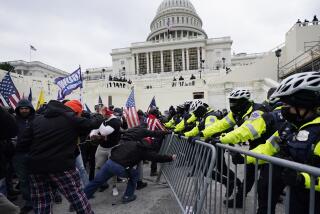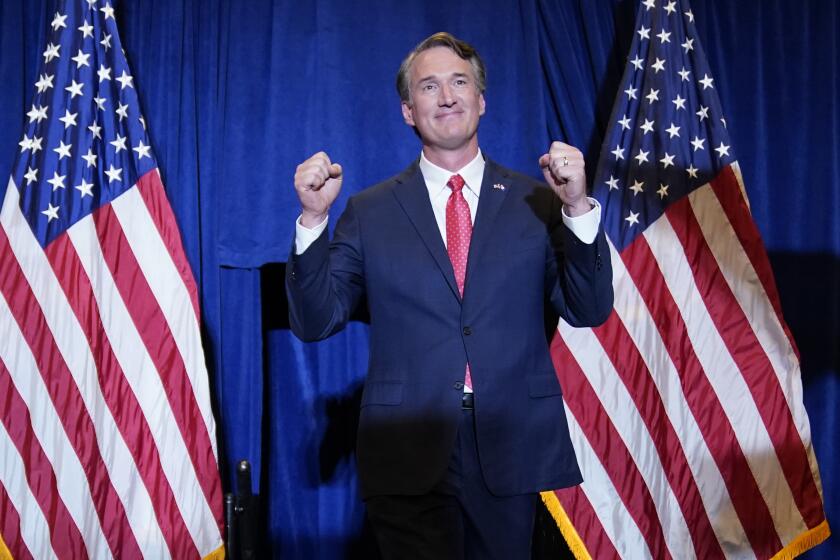In secret memo to Mueller, Trump’s lawyers said presidential powers preclude possibility of obstruction

Lawyers for President Trump argued in a secret memo submitted to special counsel Robert S. Mueller III in January that Trump could not have obstructed the FBI’s inquiry into Russian interference in the 2016 election in part because, as president, he holds complete control over federal investigations.
The president has the power to “order the termination of an investigation by the Justice Department or FBI at any time and for any reason,” Trump lawyers John Dowd and Jay Sekulow argued in the letter to Mueller, which was published Saturday by the New York Times.
As the nation’s chief law enforcement officer, Trump could “even exercise his power to pardon if so desired,” they argued. A person familiar with the letter confirmed its authenticity.
The 20-page letter offered a sweeping assertion of the powers of the presidency as well as a detailed and robust defense of Trump’s actions in dealing with the unfolding Russia investigation, including his firing of FBI Director James B. Comey in May 2017. It concluded that Trump’s actions were in keeping with the expansive powers of the presidency and could not constitute crimes.
Ultimately, Trump’s lawyers argued that the president should not be compelled to sit for an interview to assist Mueller’s effort, arguing that the White House provided full access to documents and interviews with other senior staff members that was sufficient to answer questions about Trump’s actions.
“The President’s prime function as the Chief Executive ought not be hampered by requests for interview. Having him testify demeans the Office of the President before the world,” they wrote.
The arguments parallel those that the president’s attorneys have pressed publicly for months, even as quiet negotiations over whether Trump might agree to sit voluntarily for an interview have continued. They help underscore the legal battle underway between the White House and the special counsel. Should Mueller seek to compel Trump’s testimony with a subpoena, the arguments advanced in the letter could ultimately form the basis of a courtroom fight that would probably reach the U.S. Supreme Court.
After former New York Mayor Rudolph W. Giuliani replaced Dowd as Trump’s chief lawyer in March, he reopened negotiations with Mueller about forestalling that kind of public battle through a voluntary interview. Giuliani at first expressed confidence that he could resolve the matter within weeks.
But the debate has dragged on, and, more recently, Giuliani has expressed wariness over having his client sit for an interview and said he would only agree if the special counsel’s office first turns over internal documents that shed light on the beginnings of the FBI’s investigation in 2016, before Mueller’s appointment.
He told the Washington Post last week that Trump’s lawyers are drafting a letter to Mueller laying out those terms and that Jane and Marty Raskin, a husband-and-wife team from Florida assisting Trump’s defense, are in contact with Mueller’s office three times a week.
Mueller’s team has told the president’s lawyers that they think they have the power to issue Trump a subpoena and compel his testimony, but they have not yet sought to pursue that route.
“They may do a subpoena. The subpoena would then be contested. That would be going on for months,” Giuliani said.
In a statement Saturday, Sekulow asserted that Trump’s legal position has been consistent and bemoaned the leaking of the internal document.
“We have maintained a consistent legal argument throughout the many months of this inquiry. Our legal team would not disclose internal communications with the office of special counsel. We continue to maintain cooperative relations with the office of special counsel,” he said.
In a Twitter message sent shortly before the New York Times story was posted online, Trump questioned whether Mueller’s team might have been responsible for the leak. “Is the Special Counsel/Justice Department leaking my lawyers letters to the Fake News Media?” he asked.
A spokesman for the special counsel’s office declined to comment.
The letter also provides new details about Trump’s actions in dealing with the Russia inquiry. For instance, his lawyers reveal that former national security advisor Michael Flynn twice told senior White House officials, including the vice president, before his firing in February 2017 that he had been informed that the FBI had closed its investigation into his contacts with the Russian ambassador during the presidential transition.
Comey has said that Trump asked him to let the case against Flynn go in an Oval Office meeting the day after Flynn’s firing. In their letter, Trump’s lawyers contested that account, but also argued that the president could not have been attempting to interfere in an investigation he was not aware was underway.
Trump’s lawyers also argued that the president could not have obstructed justice by firing Comey several months later. Trump’s decision to dismiss the FBI director was an appropriate use of presidential power intended to exert oversight over the bureau as a result of its missteps in the 2016 investigation of Hillary Clinton’s use of a private email server while she was secretary of State, they wrote.
They asserted that Deputy Atty. Gen. Rod Rosenstein, who is now supervising Mueller’s investigation, “actually helped to edit” Trump’s letter terminating Comey and “actively advised the President accordingly.” At the time, Rosenstein also wrote his own memo criticizing Comey’s handling of the Clinton case.
Trump’s lawyers wrote that it would be “unthinkable” for a president acting under his constitutional authority and with the “overt participation” of his deputy attorney general to have obstructed justice.
A Justice Department spokeswoman declined to comment.
In another episode Mueller has been looking into, Trump’s lawyers conceded for the first time that in July 2017 Trump “dictated” a statement to be released on behalf of his son Donald Trump Jr. about a meeting that Trump Jr. had with a Russian lawyer during the campaign.
The Washington Post first reported in July that the president had written his son’s statement, which misleadingly said the meeting was “primarily” about Russian adoptions. In fact, Trump Jr. had accepted the meeting after being told the lawyer would provide political dirt about Clinton.
In their letter, Trump’s lawyers contended that the statement was “short but accurate” and a “private” matter to be hashed out between the president and the New York Times, which had requested the statement, rather than an issue for federal prosecutors.
More to Read
Get the L.A. Times Politics newsletter
Deeply reported insights into legislation, politics and policy from Sacramento, Washington and beyond. In your inbox three times per week.
You may occasionally receive promotional content from the Los Angeles Times.










